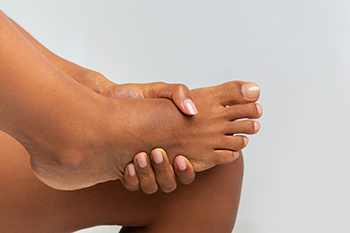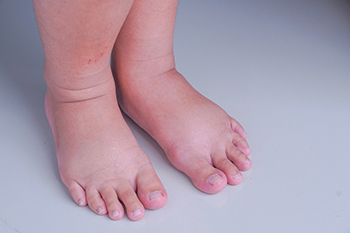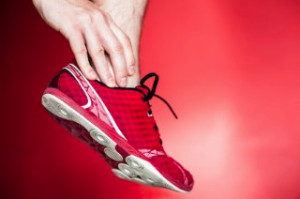 Complex regional pain syndrome, or CRPS, a perplexing and debilitating condition, manifests as chronic pain, swelling, and changes in skin color and temperature, often affecting the extremities. When CRPS strikes the feet, it introduces a unique set of challenges for individuals grappling with this complex disorder. The condition arises typically after an injury or trauma, triggering an abnormal response in the nervous system. In the feet, CRPS can lead to severe, constant pain, sensitivity to touch, and difficulty bearing weight. The affected foot may change skin texture, temperature, and color, presenting a mosaic of symptoms that defy conventional explanations. Understanding how CRPS impacts the feet is essential for accurate diagnosis and tailored treatment plans. If you have foot pain that encompasses the above symptoms, it is strongly suggested that you seek the counsel of a podiatrist who can accurately diagnose and treat CRPS.
Complex regional pain syndrome, or CRPS, a perplexing and debilitating condition, manifests as chronic pain, swelling, and changes in skin color and temperature, often affecting the extremities. When CRPS strikes the feet, it introduces a unique set of challenges for individuals grappling with this complex disorder. The condition arises typically after an injury or trauma, triggering an abnormal response in the nervous system. In the feet, CRPS can lead to severe, constant pain, sensitivity to touch, and difficulty bearing weight. The affected foot may change skin texture, temperature, and color, presenting a mosaic of symptoms that defy conventional explanations. Understanding how CRPS impacts the feet is essential for accurate diagnosis and tailored treatment plans. If you have foot pain that encompasses the above symptoms, it is strongly suggested that you seek the counsel of a podiatrist who can accurately diagnose and treat CRPS.
Foot Pain
Foot pain can be extremely painful and debilitating. If you have a foot pain, consult with one of our podiatrists from Palmetto Podiatry Group of Anderson. Our doctors will assess your condition and provide you with quality foot and ankle treatment.
Causes
Foot pain is a very broad condition that could be caused by one or more ailments. The most common include:
- Bunions
- Hammertoes
- Plantar Fasciitis
- Bone Spurs
- Corns
- Tarsal Tunnel Syndrome
- Ingrown Toenails
- Arthritis (such as Gout, Rheumatoid, and Osteoarthritis)
- Flat Feet
- Injury (from stress fractures, broken toe, foot, ankle, Achilles tendon ruptures, and sprains)
- And more
Diagnosis
To figure out the cause of foot pain, podiatrists utilize several different methods. This can range from simple visual inspections and sensation tests to X-rays and MRI scans. Prior medical history, family medical history, and any recent physical traumatic events will all be taken into consideration for a proper diagnosis.
Treatment
Treatment depends upon the cause of the foot pain. Whether it is resting, staying off the foot, or having surgery; podiatrists have a number of treatment options available for foot pain.
If you have any questions, please feel free to contact our office located in Anderson, SC . We offer the newest diagnostic and treatment technologies for all your foot care needs.

Lymphoedema is a condition where the legs or feet swell due to fluid buildup because the body's lymphatic system, which functions similarly to veins, is struggling to remove it. This swelling is called edema and can happen when you do not move enough, such as after sitting for long periods during a flight. Persistent swelling of the feet, swelling that lasts over three months, is known as chronic edema, which suggests the beginning of lymphatic failure or early lymphoedema. If left untreated, chronic foot edema can cause skin changes, deeper tissue damage, and increase the risk of infections such as cellulitis. It is often associated with chronic venous insufficiency. Various factors can contribute to lymphoedema, including genetics, obesity, inactivity, vein problems, or damage from cancer treatments. Joint surgery may also impair lymphatic vessels, leading to lymphoedema. If you are experiencing swollen feet on a regular basis, it is suggested that you make an appointment with a podiatrist as quickly as possible to obtain treatment and prevent serious complications.
Swollen feet can be a sign of an underlying condition. If you have any concerns, contact one of our podiatrists of Palmetto Podiatry Group of Anderson. Our doctors can provide the care you need to keep you pain-free and on your feet.
Swollen feet are a common ailment among pregnant women and people who stand or sit for extended periods. Aging may increase the possibility of swollen feet and patients who are obese often notice when their feet are swelling too. There may be medical reasons why swollen feet occur:
- Phlebitis - A condition that causes the veins to become inflamed and can also cause leg pain.
- Liver disease - This may lead to low blood levels of albumin which is a protein. This can cause fluid in the blood to pass into the tissues and several areas of the body can become swollen.
- Heart failure - When the heart doesn’t pump properly the blood that is normally pumped back to the heart can pool in the veins of the legs causing swollen feet.
- Kidney disease - One of the main functions of the kidneys is releasing excess fluid in the body. This type of condition can make it difficult for the kidneys to function properly, and as a result the feet may become swollen.
- Deep-vein thrombosis (DVT)- This is a serious condition where blood clots form in the veins of the legs. They can block the return of blood from the legs to the heart which may cause the feet to swell. It is important to be treated by a podiatrist if this condition is present.
Swollen feet can also be caused by bone and tendon conditions, including fractures, arthritis, and tendinitis. Additionally, there may be skin and toenail conditions and an infection may cause the feet to swell. Patients who take medicine to treat high blood pressure may be prone to getting swollen feet.
Many patients elevate their feet to help relieve the swelling and this is generally a temporary remedy. When a podiatrist is consulted the reason behind the swelling can be uncovered and subsequently treated.
If you have any questions please feel free to contact our office located in Anderson, SC . We offer the newest diagnostic tools and technology to treat your foot and ankle needs.

Ensuring your feet are in top shape is paramount for athletes who aim to maximize their performance. Here are a few tips that can help athletes avoid injuries. When selecting workout shoes, prioritize support, stability, and cushioning. Avoid wearing ill-fitting options that may look pretty but can cause discomfort, pain, and pressure. Take the time to try different types and sizes until you find the perfect pair. Enhance protection with blister prevention spray for added comfort during workouts. Socks are more than just an accessory. Choose moisture-wicking options to keep feet clean and dry, thus preventing exposure to fungus and bacteria. To prevent foot injuries, be mindful of overexertion and listen to your body's limits. Incorporate strengthening exercises like yoga or try toe stretchers for a relaxing foot yoga session. Proactively address foot pain with gentle stretches, warm-ups, and cool-downs. Maintain foot hygiene by washing and drying your feet daily, using cleansing towelettes, and spritzing with odor elimination spray pre- and post-workout. If you are experiencing foot or ankle problems related to sports or exercise, it is suggested that you schedule an appointment with a podiatrist.
Exercising your feet regularly with the proper foot wear is a great way to prevent injuries. If you have any concerns about your feet, contact one of our podiatrists of Palmetto Podiatry Group of Anderson. Our doctors will treat your foot and ankle needs.
How to Prevent Running Injuries
Many common running injuries are caused by overuse and overtraining. When the back of the kneecap starts wearing out and starts causing pain in your knee, this is commonly referred to as runner’s knee. Runner’s knee is a decrease in strength in your quadriceps and can occur if you’re not wearing properly fitted or supporting shoes. To prevent runner’s knee, focusing on hip strengthening is a good idea, as well as strengthening your quads to keep the kneecaps aligned.
What Are Some Causes of Running Injuries?
- One cause of a common running injury is called iliotibial band syndrome.
- Plantar fasciitis is also another common injury.
- Stress fractures can occur from overtraining, lack of calcium, or even your running style.
Best Ways to Prevent Running Injuries
- Wear footwear that fits properly and suits your running needs.
- Running shoes are the only protective gear that runners have to safeguard them from injury.
- Make a training schedule. Adding strengthening exercises as well as regular stretching can help keep you strong and limber and can lessen the possibility of injuries.
- Stretching keeps muscles limber; this will help you gain better flexibility.
If you have any questions please feel free to contact our office located in Anderson, SC . We offer the newest diagnostic and treatment technologies for all your foot and ankle needs.

